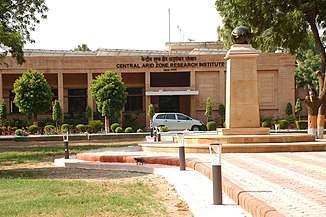Central Arid Zone Research Institute

The Central Arid Zone Research Institute has the distinction of being one of the first institutes in the world devoted to arid zone research and development. The institute made a humble beginning in 1952 when Government of India initiated Desert Afforestation Research Station at Jodhpur to carry out research on sand dune stabilization and for establishment of shelter belt plantations to arrest wind erosion. It was reorganized as Desert Afforestation and Soil Conservation Station in 1957 and finally in its present form 'Central Arid Zone Research Institute' in 1959 on recommendation of the UNESCO (United Nations Educational, Scientific and Cultural Organization) expert, Prof. C.S. Christian of Commonwealth Scientific and Industrial Research Organization, Australia. In 1966, the institute was brought under the administrative control of Indian Council of Agricultural Research (ICAR), New Delhi.
The institute conducts multi-disciplinary research to seek solutions to the problems of farming in arid regions of the country. The hot arid zone covers about 32 million ha area in the states of Rajasthan, Gujarat, Punjab, Haryana, Karnataka and Andhra Pradesh, while the cold arid zone, covering about 7 million ha area, is located in the states of Jammu and Kashmir and Himachal Pradesh.
|
केन्द्रीय शुष्क क्षेत्र अनुसन्धान संस्थान (काजरी) | |
Other name | CAZRI |
|---|---|
| Motto | Enhancing resilience of arid lands |
| Established | 1959 |
Parent institution | Indian Council of Agricultural Research |
| Director | Dr. O.P.Yadav |
| Location |
Jodhpur, Rajasthan, 342003, India 26o15'12.11" N 72o59'30.99"E |
Mandate
- Basic and applied research on sustainable farming systems in arid ecosystem
- Repository of information on the state of natural resources and desertification processes
- Livestock-based farming systems and range management practices for the chronically drought affected areas
- Generation and transfer of location-specific technologies Infrastructure
CAZRI has five Regional Research Stations (RRSs) at Pali, Jaisalmer and Bikaner in Rajasthan; Kukma-Bhuj in Gujarat and Leh in Jammu and Kashmir. The institute also hosts an All India National Network Project on Vertebrate Pest Management with its centres spread in many institutes and SAUs located in different agro ecological regions of the country.
The institute is carrying out systematic research on understanding and managing hot arid region's natural resources, sustainable farming systems, improvement of plant resources especially the crops, livestock production and management and use of alternate energy resources.

Several need-based, cost effective technologies like sand dune stabilization, wind erosion control, water management, grassland improvement, watershed development, rehabilitation of wastelands, arid land farming systems, arid horticulture, alternate land use strategies, pest management, solar devices, etc. have been developed and transferred to farmers and other stakeholders.
This institute has the rare distinction in having a full-fledged section on renewable energy and has developed many solar energy based gadgets/devices, like animal feed cooker, dryers, water heaters, candle making device, cool chambers, etc., which are finding place in rural households. Agro-voltaic system of 105 kW capacity has been developed at Jodhpur integrating crop production, PV-based electricity generation and rainwater harvesting. The institute has evolved technologies and strategies for combating drought and desertification.

It has developed close liaison with several national and international organizations and has made major strides in providing advisories and consultancies to many agencies in India and abroad. Besides, CAZRI is a major destination for capacity building of scientists, policy planners and extension officials related to arid zone development.
Through its extension wing and Krishi Vigyan Kendras (located at Jodhpur, Pali and Kukma-Bhuj) the institute is in direct touch with farmers, state government officials, NGOs and other stakeholders and organises regular trainings and demonstrations.
Facilities
The headquarter and regional research stations (RRSs) of the institute are well equipped with laboratories, research farms, field laboratories and office facilities. One auditorium, two conference rooms, a museum, one international guest house, one training hostel and one farmers' hostel are the other facilities available at the headquarter. Krishi Vigyan Kendras (Jodhpur and Pali), have training and residential facilities for farmers, lend additional support for the transfer of technologies and outreach programs of the institute. The institute has a wide collection of books and journals in its library named after Dr. P.C. Raheja. The library uses bar coding of books. The Environment Information System (ENVIS) centre on desertification is also part of institute. All the Regional Research Stations are linked with Consortium for e-resources in Agriculture (CeRA) by static ID.
See also
- Arid Forest Research Institute Jodhpur
- Central Sheep and Wool Research Institute Avikanagar
- Indian Council of Agricultural Research
- Indian Council of Forestry Research and Education
- Van Vigyan Kendra (VVK) Forest Science Centres
External links